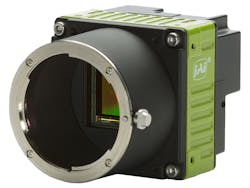Fast industrial-grade color and monochrome cameras for virtual reality and surveillance introduced by JAI
SAN JOSE, Calif. – JAI Inc. in San Jose, Calif., is introducing four 45-megapixel Spark series industrial-grade cameras for virtual reality, surveillance, facial recognition, traffic and street mapping, metrology, and broadcast sports.
These cameras have CoaXPress v2.0 interfaces that can transfer data at 12.5 gigabits per second per lane.
The SP-45000-CXP4A, which comes in monochrome and color versions, has a four-channel CXP-12 interface with a maximum data transfer of 50 gigabits per second to enable the camera to provide 8K TV resolution output of 7680 by 4320 pixels at 60 frames per second or higher for 8-, 10-, or 12-bit pixel formats.
The industrial-grade camera delivers full-resolution 8-bit, 44.7-megapixel output at 52 frames per second or at 47 frames per second for 10- or 12-bit output. The faster CoaXPress interface enables users to reduce the number of lanes used, thereby saving on cabling costs, or to work at greater bit depths when maximum image quality and dynamic range are required.
Related: 2.8-megapixel CCD cameras for high-end surveillance applications introduced by JAI
The cameras feature the XGS 45000 CMOS imager (global shutter) from OnSemi, which has a dark noise rating of 4.5 electrons, and a standard dynamic range of 67 decibels.
A special built-in high-dynamic-range (HDR) mode that uses a dual gain technique applied to one captured image, has the dynamic range to 73 decibels with a maximum frame rate of 30 frames per second. HDR output moves in a 14-bit linear format, or in a knee-point compressed format at a bit depth of 8, 10, or 12 bits.
JAI also has introduced the SP-45001M-CXP2A monochrome camera and a the SP-45001C-CXP2A color camera with CoaXPress interfaces with CXP-12 lane speeds but use a reduced-speed version of the XGS 45000 CMOS imager.
These models have a two-channel CoaXPress interface that saves on cabling cost and complexity while also carrying a price tag that is 20 percent lower than the full-speed models.
For lower-speed applications, users can enhance image quality by using the camera's built-in frame integration capabilities to average as many as eight consecutive frames to reduce shot noise in the image.
The image sensors in the four models have 3.2-micron square pixels and a diagonal of 31.5 millimeters. Other features include single- and multiple region-of-interest (ROI) capabilities, horizontal and vertical image flip, a sequencer trigger function, automatic level control combining auto-shutter and auto-gain capabilities, and built-in control lenses connected via a Birger Mount.
For more information contact JAI online at www.jai.com.

